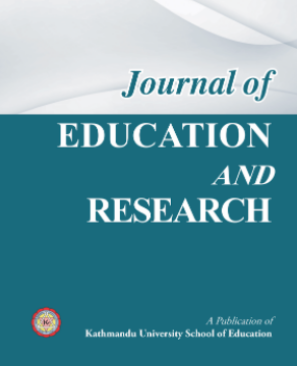
Public Perception of the Quality of Academic Education Program
Original Article
Journal of Education and Research, Volume 3, Issue 1, 2013, 52-64, https://doi.org/10.3126/jer.v3i0.7852
Publication date: Mar 29, 2013
Views: 546 | Downloads: 263
How to cite this article
APA
In-text citation: (Shrestha, 2013)
Reference: Shrestha, B. K. (2013). Public Perception of the Quality of Academic Education Program. Journal of Education and Research, 3(1), 52-64. https://doi.org/10.3126/jer.v3i0.7852
Reference: Shrestha, B. K. (2013). Public Perception of the Quality of Academic Education Program. Journal of Education and Research, 3(1), 52-64. https://doi.org/10.3126/jer.v3i0.7852
Vancouver
In-text citation: (1), (2), (3), etc.
Reference: Shrestha BK. Public Perception of the Quality of Academic Education Program. Journal of Education and Research. 2013;3(1):52-64. https://doi.org/10.3126/jer.v3i0.7852
Reference: Shrestha BK. Public Perception of the Quality of Academic Education Program. Journal of Education and Research. 2013;3(1):52-64. https://doi.org/10.3126/jer.v3i0.7852
AMA
In-text citation: (1), (2), (3), etc.
Reference: Shrestha BK. Public Perception of the Quality of Academic Education Program. Journal of Education and Research. 2013;3(1), 52-64. https://doi.org/10.3126/jer.v3i0.7852
Reference: Shrestha BK. Public Perception of the Quality of Academic Education Program. Journal of Education and Research. 2013;3(1), 52-64. https://doi.org/10.3126/jer.v3i0.7852
Chicago
In-text citation: (Shrestha, 2013)
Reference: Shrestha, Binod Krishna. "Public Perception of the Quality of Academic Education Program". Journal of Education and Research 2013 3 no. 1 (2013): 52-64. https://doi.org/10.3126/jer.v3i0.7852
Reference: Shrestha, Binod Krishna. "Public Perception of the Quality of Academic Education Program". Journal of Education and Research 2013 3 no. 1 (2013): 52-64. https://doi.org/10.3126/jer.v3i0.7852
Harvard
In-text citation: (Shrestha, 2013)
Reference: Shrestha, B. K. (2013). Public Perception of the Quality of Academic Education Program. Journal of Education and Research, 3(1), pp. 52-64. https://doi.org/10.3126/jer.v3i0.7852
Reference: Shrestha, B. K. (2013). Public Perception of the Quality of Academic Education Program. Journal of Education and Research, 3(1), pp. 52-64. https://doi.org/10.3126/jer.v3i0.7852
MLA
In-text citation: (Shrestha, 2013)
Reference: Shrestha, Binod Krishna "Public Perception of the Quality of Academic Education Program". Journal of Education and Research, vol. 3, no. 1, 2013, pp. 52-64. https://doi.org/10.3126/jer.v3i0.7852
Reference: Shrestha, Binod Krishna "Public Perception of the Quality of Academic Education Program". Journal of Education and Research, vol. 3, no. 1, 2013, pp. 52-64. https://doi.org/10.3126/jer.v3i0.7852
ABSTRACT
There is no information on what exactly quality is as perceived by the public as the potential recipients of education programs to guide policy makers to deliver quality. This study explored the determinants of quality of education program as perceived by the public. This study is important because a quality concept starts from customers according to which the providers should develop their programs. Following the theory of customers' perceptions, this study assessed stakeholders' beliefs about quality of education program rather than objective reality that organizations offer as quality education. Through a survey on about 220 respondents and corresponding data analysis, this study found out the determinants of perceived quality of education with special reference to MBA programs in Nepal. The variables included in this study were quality of faculty, quality of infrastructure, graduate employability, curriculum and reputation as antecedents of perceived quality and perceived value. This study found out that perceived quality is determined by reputation of the program as credible and trustworthy which is influenced by graduate employability, practical curriculum and competent faculty.
KEYWORDS
REFERENCES
---
LICENSE
This work is licensed under a Creative Commons Attribution 4.0 International License.
